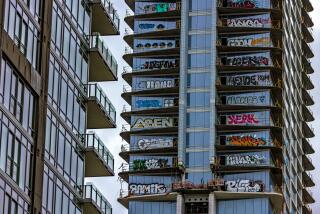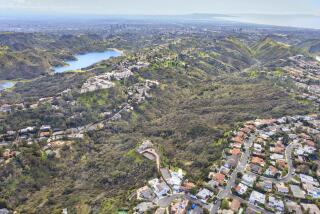Japanese Unload U.S. Property More Quickly Than Expected : Real estate: $6.36 billion worth was sold or put on the auction block in 1994. Bigger sales are expected this year.
- Share via
Moving much more aggressively than expected, Japanese investors sold or put on the auction block $6.36 billion in U.S. real estate in 1994 and are expected to unload an even larger portion of their troubled U.S. property portfolio this year, according an annual investment survey released Thursday.
From California hotels to New York skyscrapers, the Japanese selloff last year was almost double that reported in 1993 and could reach as much as $10 billion this year, much of it in California, according to E&Y; Kenneth Leventhal Real Estate Group.
“California was one of the markets targeted for the largest amount of disinvestment,” said Jack R. Rodman, director of the Kenneth Leventhal Pacific Rim real estate practice in Los Angeles. “You are going to see it in the office sector, and you are going to see it in Downtown Los Angeles.”
Most recently, the Japanese bank that owns the Hotel Bel-Air was reportedly close to selling the luxury property to the Sultan of Brunei’s brother for an estimated $60 million. The Long-Term Credit Bank of Japan took over the hotel from a Japanese group that could no longer make payments on the property, which was purchased in 1989 for $110 million.
While the Japanese selloff has accelerated, however, the property market has been buoyed in part by European investors eager to snap up U.S. properties. “They are finding that U.S. assets are the cheapest assets in the world,” said Thomas Barrack Jr., president and chief executive of Colony Capital, a Los Angeles-based real estate investment firm.
Until recently, the Japanese had been reluctant to sell off and recognize losses on their U.S. real estate holdings, which were bought at peak prices in the mid- to late 1980s. The value of those and other commercial properties fell dramatically during a nationwide slump in the early 1990s.
But the sales pace has picked up in the past two years as Japanese lenders have become more aggressive in writing off bad loans on U.S. real estate and bank-owned property. In addition, the strong Japanese yen mitigates the financial loss for the investors who have to repay loans in U.S. dollars, said real estate industry observers.
The Japanese, whose buying spree sparked fears about the foreign acquisition of prominent U.S. buildings, will probably end up selling much of their holdings to American investors and “vulture funds” that specialize in distressed property.
“It’s not unusual for American investors to be knocking on the doors of Japanese” banks and other property owners, said Ronald Silva, a partner at Lowe Enterprises Inc., a Los Angeles-based firm that bids on property on behalf of public pension funds.
In one deal last year, the Los Angeles County Employees Retirement Assn. bought the Ritz-Carlton Huntington for $42 million after Dai-Ichi Kangyo Bank Ltd. defaulted on a $114-million note on the Pasadena hotel.
The low value of the U.S. dollar is also making the Japanese holdings attractive to other foreign buyers.
The Kenneth Leventhal survey, which is the most comprehensive study of Japanese real estate activity in the United States, did not track the purchase of U.S. property because such acquisitions were believed to be negligible, Rodman said.
The survey has been controversial because some real estate brokers and analysts have not seen any substantial sales activity on the part of the Japanese.
(BEGIN TEXT OF INFOBOX / INFOGRAPHIC)
Selling Off
After snapping up U.S. real estate in the 1980s, Japanese investors are now unloading their loss-ridden American properties at a rapid pace. The Japanese sale of American properties accelerated dramatically last year after a large selloff in 1993. Japanese buying and selling of U.S. property, in billions of dollars:
1994: -$6.36
Source: E&Y; Kenneth Leventhal Real Estate Group
More to Read
Inside the business of entertainment
The Wide Shot brings you news, analysis and insights on everything from streaming wars to production — and what it all means for the future.
You may occasionally receive promotional content from the Los Angeles Times.










